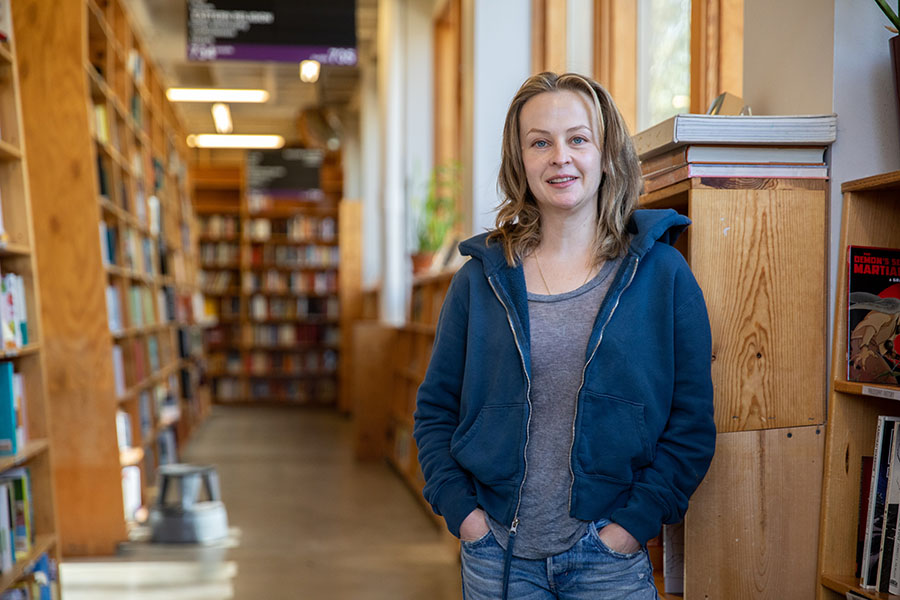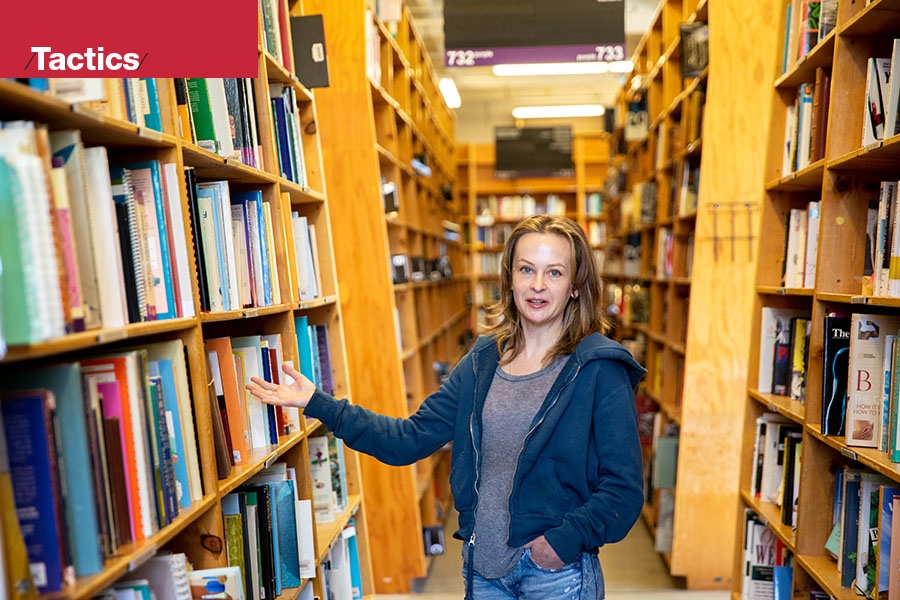Emily Powell, owner and president of Powell’s Books, on going high tech and surviving the pandemic.
It has been a transformational year for Powell’s Books, downtown Portland’s iconic independent bookstore. It faced permanent closure in the spring of last year when the onset of the pandemic forced it to close for several months.
Financing from the federal government’s Paycheck Protection Program has helped it stay afloat, but it faces the challenge of clawing its way back after losing 80% of sales over the past year. The lack of tourists and foot traffic in downtown Portland hamper the speed of its recovery.
In this interview, Emily Powell, owner and president of Powell’s Books, describes the technological transformation underway to boost the bookstore’s online catalog, and why the future of brick-and-mortar retail is bright.
This interview has been edited for length and clarity.
What impact have the pandemic and forced closures had on your brick-and-mortar stores?
Financially, everything we knew about how to run a brick-and-mortar store had to be reconsidered. Nothing could be done by rote. Something as simple as having a customer check out at a cash register had to be rethought.
It was just a very laborious process to rethink all of our operations and figure out what we could manage from an expense side, given that we had lost the vast majority of our sales.
What is the biggest change to the business that you had to make?
Losing 80% of our sales forced us to rethink everything. Certainly, without the support of the PPP program, we wouldn’t be here. We had to figure out how to keep our business open and functional without the support of most of our sales.
But we also had to capture the sales we were getting through our online business and then, little by little, through our stores. That was the biggest change. We are still not out of this situation.
How has the transition to online sales gone over the past 12 months?
Our internet sales initially went through the roof. But it was a moment in time. It didn’t last. On the one hand, it was phenomenal; on the other hand, we weren’t at all prepared for it. We were expecting at the time to shutter our entire business, so we had moved quickly as we expected to have zero employees for the duration of the pandemic.
We had to staff back up and that took quite a lot of time. That peak slowly came down, and now we are still on the downhill side, unfortunately. We are trying to keep hold of the online sales as our stores reopen, but we are not even close to regaining our previous sales pattern.
Will you survive the economic fallout from the pandemic?
I think we will. I have faith and confidence that with everyone who works at Powell’s, our management team and support from the government, we will figure it out one way or another. At this point, I feel more confident. We are not out of the woods, but I am more confident we can get to the other side of this, assuming the trajectory of the pandemic continues with more vaccinations and we manage to keep variants somewhat under control.
Businesses in downtown Portland, where your flagship store is located, have suffered greatly from the loss of foot traffic, vandalism and increasing numbers of homeless people. How has this impacted your downtown store?
On the one hand, I would say it hasn’t in the sense that we have been relatively safe. But of course, people are not coming downtown like they used to. It is a little hard to say because we also don’t have tourism. I don’t know when tourism will return. It is hard to pull apart those related pieces.
We will not come back in a stronger way until downtown is more open. I have started to talk with peers in the community about how we can synchronize the reopening of downtown Portland, so folks know businesses are open, restaurants are open, there are things to do, and the downtown is a place we can return to and enjoy again.
 Emily Powell, owner and president of Powell’s Books Photo by Jason E. Kaplan
Emily Powell, owner and president of Powell’s Books Photo by Jason E. Kaplan
Does there need to be more collaboration among businesses and business associations to achieve a synchronized reopening?
I see that happening in my neck of the woods. But it is something I would love to see the city help orchestrate. A place where a conversation and partnerships can be achieved to synchronize that reopening and do so in a way that supports Portland’s ongoing revival would be a huge help.
Have you considered moving your flagship store out of downtown?
Definitely not. This is our 50th anniversary. We are staying put. I feel very committed to Portland and, certainly, to the downtown community, but also to its central role in our greater tricounty region and state.
Consumers’ use of e-commerce has accelerated during the pandemic. What is the future of your brick-and-mortar stores given this trend?
While folks are certainly shopping online — and that trend was accelerating before the pandemic and continues to accelerate — I also think folks are eager to have the shopping experience outside of their homes. Bookselling is a unique form of retail in that it really is an experience. It is a place you go with your friends, family, where you wander, and maybe have a coffee and a snack. I am not worried about the future of brick-and-mortar retail. It is going to have a robust future. We all need a place to be.
At the same time, online sales are important to our business. I am going to do everything I can to grow those. We need those sales for a stable foundation, as brick and mortar has its ebbs and flows.
Will your online sales eclipse in-store sales?
I would love that to happen because it means we will have steady in-store sales as folks return to in-person shopping and tourism returns, and we have made a connection with folks online, both locally and outside of Oregon. The goal is to reinvigorate both experiences for Powell’s.
Our web experience needs a fair amount of fortification. We have had technology challenges for quite some time. We were working on them before the pandemic and we continue to address them now.
What technology challenges are you facing?
We have had a decades-long challenge to stay current with our underlying technology that supports our e-commerce business. We have a wildly large database because of the nature of our business — used books as well as new books.
Most businesses of our size might have a manageable SKU (stock keeping unit) count, but we have hundreds of millions of SKUs in our database. For the size of our business, that is unwieldly.
There are off-the-shelf technology solutions that can solve our needs both from an e-commerce perspective and from a brick-and-mortar store perspective. But we have always tried to craft solutions ourselves. That means we have to be a technology company as well as a book company. It puts us in the same pool of water as Amazon or Barnes & Noble, but we are much smaller.
The challenge is how do you manage to swim in the same water when you don’t have large resources, and the demands and expectations from your customers are equivalent?
We are approaching the cusp of turning the corner. We have interesting work underway and a new team we put together in 2019. We have a couple of years of work ahead of us, but we can say we are in a new frontier.
Your decision to keep Andy Ngo’s book Unmasked in your online catalog was criticized early this year because of its depiction of the left-wing, anti-fascist movement. Your bookstore defended carrying the book in its online catalog, saying it believes in free speech. Do you feel free speech is under attack right now?
For better for worse, free speech is always under attack. We had become a little complacent about that reality in the past decade. It is seeing a new kind of attention in the Trump and post-Trump era. Folks who fought for free speech in the ’80s and ’90s made a lot of progress. The attention it is getting is from a different, new direction. I don’t know if it is under attack any more than it has been historically, it is just maybe a new kind of attack.
As a bookseller, what role do you think you play in protecting free speech?
We have a unique position in that conversation because we are so large. If we were a small, neighborhood bookstore with a limited capacity, it would be easy to say we focus on, say, children’s books, and that we won’t carry anything else. But Powell’s has staked its livelihood on being a different enterprise altogether, which is: If you are interested in this book, we want to understand that and have it on a shelf somewhere.
Once you open yourself up to the entire world of the written word, you find that trying to draw lines around what is acceptable and what is unacceptable to sell is almost impossible.
Over the next 12 months, what will be the biggest change that consumers will see in your brick-and-mortar stores?
We have been here for 50 years and I hope to be here for another 50 if we are lucky. I always say our job is to keep getting better at the job we do, serving our customers and community, but nobody should notice that we are changing. You should never walk into our store and think you don’t recognize it and it doesn’t feel that it is your bookstore any longer, or that you can’t find your books.
The goal is never to alienate anyone [but] to make sure everyone feels welcome and enjoys coming to us. It will fundamentally be a different bookstore in 50 years, but hopefully there isn’t a single day when someone walks in and says: “No thanks, this isn’t for me.”
To subscribe to Oregon Business, click here.







